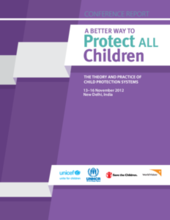In November 2012, more than 130 policymakers, academics, practitioners and other experts committed to CP systems and coming from 50 countries met in New Delhi over four days for a major conference entitled “A Better Way to Protect ALL Children: The Theory and Practice of Child Protection Systems.” This conference was co-hosted by four organisations – UNICEF, UNHCR, Save the Children and World Vision. The report from the conference encapsulates the substantive content of the presentations and related discussion; provides an analysis and documents the journey; and suggest an agenda, or at least direction, for future work on CP systems.
The conference participants discussed the definition and boundaries of a child protection system and a typology was proposed to facilitate discussion about the objectives and performance of such systems and inform the choices made about the way in which a particular system will develop. Intended to be applicable globally, it includes less formal systems as well as more formal and statutory systems, recognizes a diversity of approaches or orientations used by these systems towards the child in her/his family and community, and operates in the overall socio-economic and political developments of a particular country.
The development of child protection systems across regions was explored, with learning from High Income, Middle and Low Income countries presented through country case studies. Discussion highlighted how regional and country-specific values regarding children, families and the relationship between the State and individuals; the integrity of institutions; and the broader political and economic situation all drive and shape CP systems. The importance of ‘system thinking’ to guide child protection system strengthening was highlighted in particular, providing a more multidimensional and complex concept of CP systems and their many elements, one that is based a good understanding of how systems change happens.
Many of the presentations addressed the importance of intervening early in the life of the child through the provision of services and support to the child and his/her family, as well as of the need to make prevention a priority. Five round-table sessions explored ways in which specific groups of children with particular needs may be addressed within a systems framework, including one on children without parental care. Among many other speakers:
- Fred Wulczyn, Senior Research Fellow at Chapin Hall at the University of Chicago, presented on his work assembling data on children in out-of-home care, including work focused on understanding how the supply and demand for beds in residential settings impact the placement of children, specifically to understand if residential placements are in fact driven by supply rather than need.
- Rebecca Davis, Professor and Director of the Center for International Social Work at Rutgers University, suggested that prevention might be relative to the context and provided learning from Romania, and work to prevent institutionalisation in that country.
- Armando Barrientos, Professor and Research Director at the Brooks World Poverty Institute, University of Manchester, explored in more depth the connection between social protection and child protection, and highlighted the tension between individual rights and family agency, noting that it is important to consider how we engage families.
- Alexander Krueger, Director and Co-founder of Child Frontiers, highlighted the benefits and risks of using issues as entry points to strengthen CP systems and how work on a specific issue, like alternative care, has provided opportunities to engage with a population, gather data, garner political support and raise funds and in this way has also served as a catalyst.
- Anna Feuchtwang, Chief Executive of EveryChild, shared a model for placing care at the heart of CP systems and highlighted how childcare reform can act as an impetus for broader change – whilst failure to address children’s care has a major impact not only on children’s current well-being, but also on their ability to contribute to societies as adults.
- Gwen Burchell, Director of United Aid for Azerbaijan (UAFA), presented a case study on how children with disabilities have been prioritised in child protection reform in Azerbaijan, and how her organization is working to address among other things a lack of care providers, and a failure to prioritise children with disabilities in de-institutionalisation efforts.
- Dilli Guragai, Senior Adviser, Save the Children Nepal, presented on Safe Communities, a Save the Children initiative to protect children in jeopardy in Nepal (2009– 2011), that includes a component on preventing children from being separated from their parents and reintegrating children from institutional care to parental/ community-based care;
Full documentation from the conference, including all the presentations and papers are available at: http://knowledge-gateway.org/sharekluo5tgnjrn31p71ra1zp7b2hnkl48j5vz27/childprotection/cpsystems/cpsconference/library.

